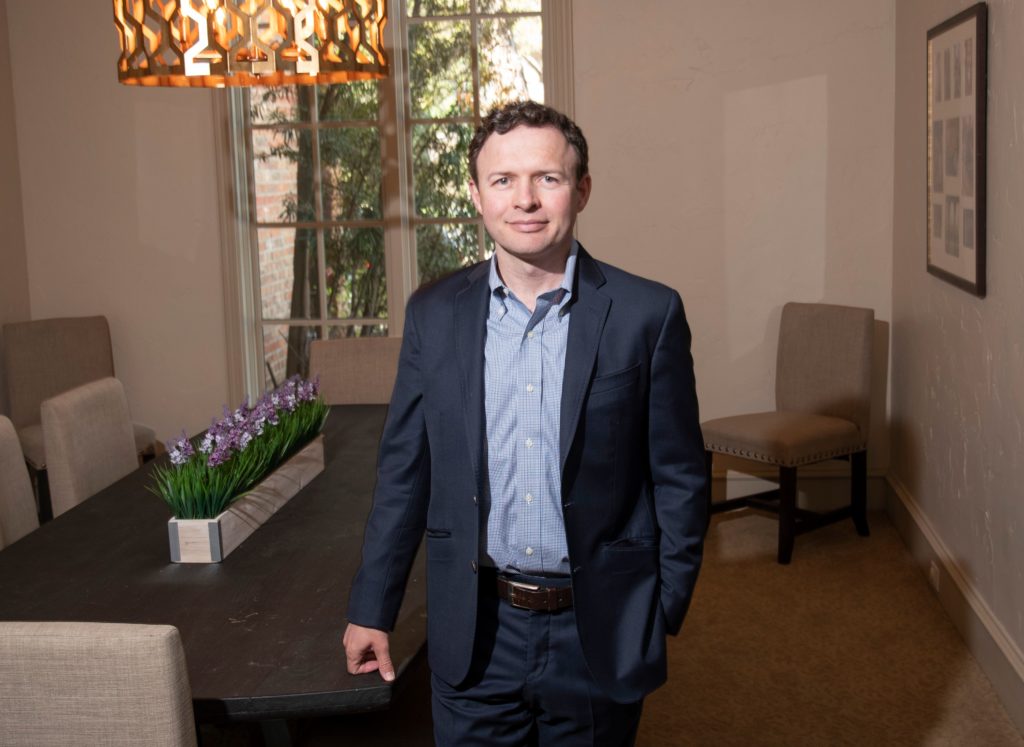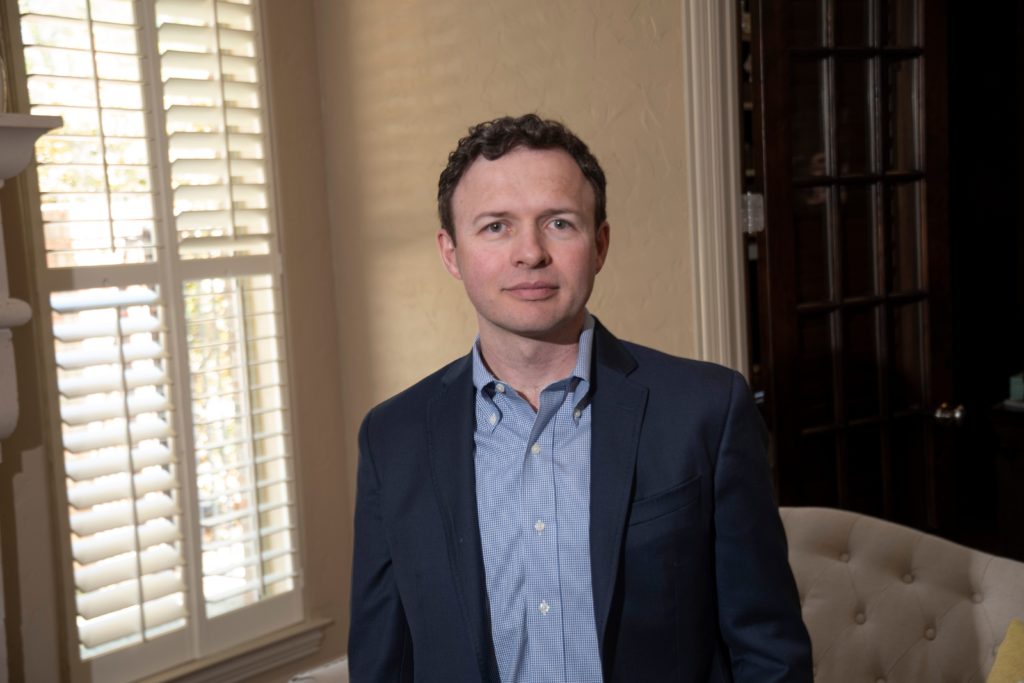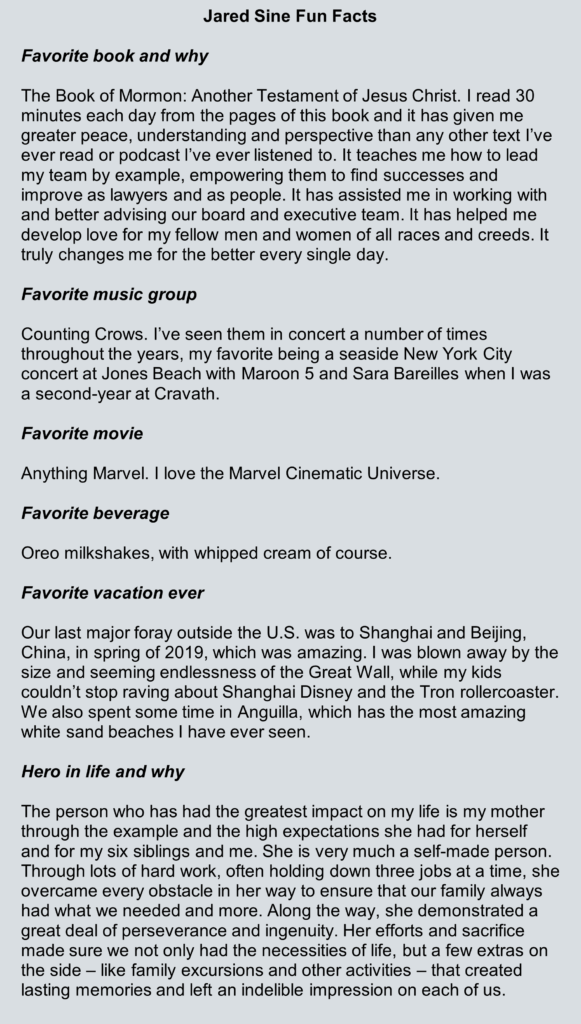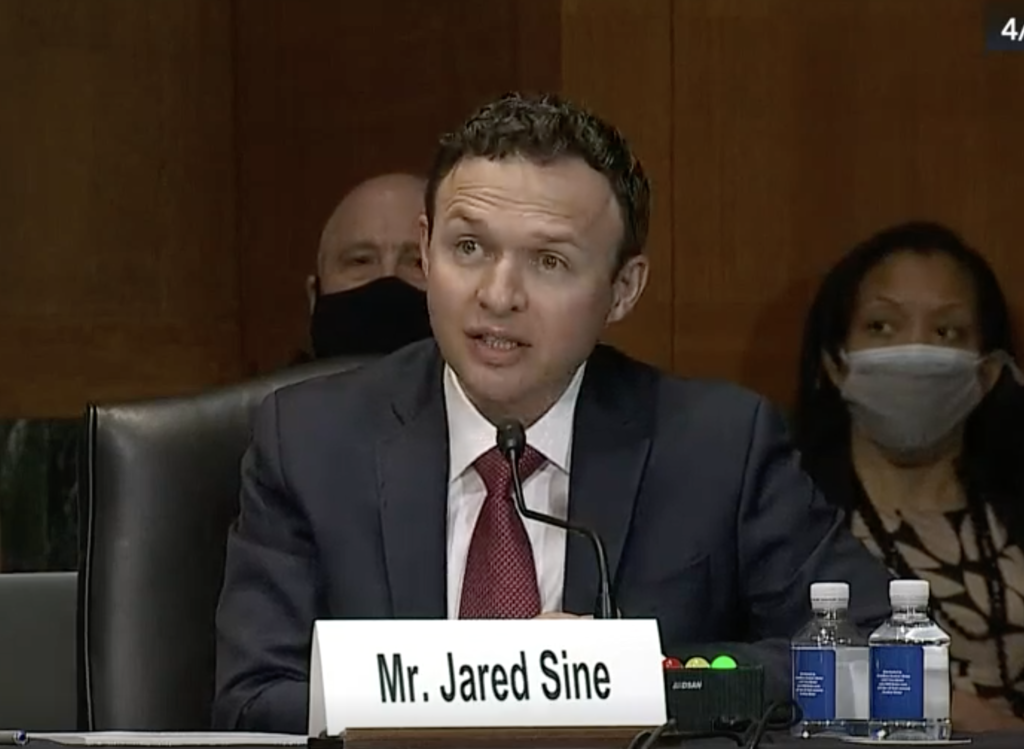
As 2019 winded down, executives at Dallas-based Match Group and Barry Diller’s IAC, agreed that it was time to separate the online dating service provider from its parent company because Match, valued at an estimated $30 billion, had grown to be two-thirds of IAC’s value.
The problem was a traditional spinoff would have created huge tax burdens for IAC shareholders, which no one wanted.
The executive team, which included Match Group Chief Legal Officer Jared Sine, agreed that the transaction had to be structured as a “reverse spin-off,” which meant that IAC’s non-Match assets would be placed into the new publicly traded entity.
The Match entities – which include OkCupid, OurTime, PlentyofFish, BlackPeopleMeet, Tinder and 35 more branded apps in 40 different languages operating in 190 countries – would remain as the assets in the original IAC company. An exchange ratio mechanism was developed to divide the ownership of the new Match post-closing.
“This was a massively complex transaction that we knew was going to require tens of thousands of pages of documents, endless hours of our team together preparing those documents, reviewing those documents and reworking those documents,” Sine told The Texas Lawbook in an extended interview.
“There were lots of moving pieces and parts,” he said. “The challenge is getting everyone to agree to terms and on the same page and then organizing and arranging all of the moving parts so that they work toward the same outcome of closing the deal.”
And then Covid-19 hit. For health reasons, everyone was sent home to work remotely. The in-person negotiations ended. The flights from DFW to New York stopped. In addition, Match’s stock price plummeted more than 30%. The potential for disaster seemed ominous.
“The onset of the pandemic in the middle of the deal greatly complicated this mechanism, challenging the assumptions that had been made when the exchange ratio was negotiated between IAC and the Match special committee,” said William Regner, a partner at Debevoise & Plimpton in New York, who was involved in the transaction.
“While it turned out that the online dating business model – and the deep-seated human need for connection – is stronger than even a global pandemic, this was hardly a given in the spring, before society learned to adapt to a world of face masks and social distancing,” Regner said. “As a result, the exchange ratio swung wildly with the trading prices of Match – 25% in either direction – before a final number was determined.”
The Match stock price rebounded from $44 at the start of the pandemic to near $90 June 25 when the transaction closed. The price is now $144 a share.
“It was definitely not your everyday $30 billion reverse spin-off,” Sine said.
PREMIUM SUBSCRIBERS: TO FIND A SPECIAL Q&A WITH JARED SINE CLICK HERE.
The Association of Corporate Counsel’s DFW Chapter and The Texas Lawbook agree. Sine, the Match Group legal department and Debevoise are a finalist for the 2020 DFW Outstanding Corporate Counsel Award for M&A Deal of the Year. The finalists will be celebrated and the winners announced at an in-person ceremony June 3 at the George Bush Institute.
“Match’s in-house legal team was exceptionally hands-on across all aspects of the deal, supporting the special committee’s negotiations with IAC as well as planning and executing the many agreements and documents for the operational decoupling,” said Regner, who nominated Sine, associate GC Paco Villamar and senior counsel David Shipley for the award.
“Keeping a deal of this complexity on track – in the midst of the shift to remote working and a CEO change – required exceptional leadership from Jared, Paco and David,” he said.
Sine said the credit goes to Villamar, Shipley and his team, as well as the lawyers at Debevoise.
“As I look at the amazing people that have caught the shared vision of where we think we can go with our brand and our influence around the globe – I am more than humbled,” Sine said. “I am surrounded by the best in the business, individuals who are not only incredible at what they do but are also incredibly dedicated, committed and all-around good people. I am so glad they have all chosen to take this journey with me.”
The $30 billion reverse spin-off was not Sine’s only accomplishment in 2020. Last summer, Sine also settled a highly contentious IP lawsuit with Bumble, a competitor founded by a couple of former Match employees. And he and his team negotiated a $1.725 billion acquisition of Hyperconnect, a social discovery and video technology business based in Seoul, South Korea.
Sine made news again last month when he testified for the U.S. Senate Judiciary Committee about anticompetitive practices of Apple and Google regarding their domination of the app platform space. He told Sen. Amy Klobuchar that the fee from the App Store is Match Group’s single largest expense at over half a billion-dollars and how Apple said Match should just be happy that the tech giant didn’t take all of its money.
“And yes, we are fighting the two biggest and most powerful companies in the history of the world,” he said. “All in a day’s work.”
Sine was born and raised in The Avenues neighborhood of Salt Lake City and even attended East High School, which was featured in High School Musical.
“That was before everyone in the world wanted to attend East High School,” he said. “And no, the student body at East did not look like Zac Efron or Vanessa Hudgens.”
Sine’s father was a lawyer-turned-businessman and is a reason why Sine took the career path he did.
“My dad’s business didn’t do well,” he says. “If he had been given better legal advice and counsel, his business might very well have turned out differently. Unfortunately, given his lack of experience with the law, he was relatively unsuccessful as a sole practitioner. This is one of the reasons I decided early on I wanted to work for a large law firm out of law school – to gain the critical experience to be successful – and then go and work in the corporate world.”
Sine’s mother grew up poor. She had no college education and took on three jobs and taught Sine to work hard. But his mom is now president of the Utah Restaurant Association, “one of the fiercest lobbying forces in Utah.”

In the first grade, Sine told teachers he wanted to be a lawyer when he grew up, and “it kind of stuck with me.”
“As I grew older, a lot of the people I respected in my life were lawyers, and I felt like I could achieve a lot of my personal goals as a lawyer,” he said.
Sine is a devoted member of the Church of Jesus Christ of Latter-day Saints. Mormon church leaders strongly encourage its teenaged boys to do two years of missionary service that combines community and humanitarian outreach programs with faith-based efforts.
Sine was assigned to go to the Philippines.
“As a kid who’d grown up in Utah without ever traveling outside the U.S., going to the Philippines was a wild experience,” he said. “It’s a very difficult thing to do – train for service and learn culture and the Tagoloan language in three months. You are allowed two calls home a year to talk with your family. You learn to grow up quickly. It requires that you rely on a higher power.”
Sine was 19 and landed in Manila in September 1998. As he and others packed into an old, retrofitted school bus, the worst typhoon in 30 years hit the island. The downpour caused the roads to flood and water literally rose to the level of the bus’s headlights.
“My first area [of mission service] didn’t have running water or electricity for the first three months,” he said. “It was amazing and humbling to see the meager circumstances of many of the people we served and came to know. Few were lucky enough to have a cement floor and cinderblock walls.”
“It taught me to appreciate all that I have here in the states and that there are much more important aspects of life than what we own or where we live,” he said.
A few months into his mission service, Sine suddenly became seriously ill.
“Something in my system was rejecting the environment in the Philippines,” he said. “I tried to fight through it, but to no avail. My body was failing me. But learning to accept the limitations of your body while fighting through it teaches you a lot about perseverance and giving all you can.”
Medical officials told Sine to return home to be treated and recover. A month later, he was reassigned to Boston, which he said “very much felt like a second foreign country with all the accents and history.”
But in Boston, he met two of his life’s most important mentors: former Atlanta Braves star outfielder Dale Murphy, who served as the mission’s president, and Harvard Business School professor Clayton Christensen, author of The Innovator’s Dilemma and the father of the theory of disruption.
“While they were both incredibly gifted men, what I learned from them that I cherish most was the importance of remaining humble no matter how successful you might be career-wise, loving others and the great gift that service is in life.”
Sine said he learned from Murphy and Christenson how to work with people from various backgrounds and with diverse personalities and life views.
“Through these experiences, I learned how to work with people and appreciate the unique value each person can add because of their diverse backgrounds and perspectives,” he said. “It helped me understand that I need to surround myself with people who are different than me if I want to have the most robust and realistic view of the issues that face us and possible solutions.”

Sine went to college at Brigham Young University, where he received his bachelor’s degree in economics in 2004. Three years later, he received his law degree from BYU. During law school, however, he became severely sick again and ended up in the hospital needing an emergency and life-saving surgery, which caused him to miss six of the first eight weeks of law school.
He said the mission experience in the Philippines helped him deal with the illness during law school.
“For the next three years, I had to survive on a liquid diet – think four Jamba juices a day,” he said. “What I learned on my mission played a huge role in navigating these challenges.”
In 2007, he graduated from BYU law school and joined Cravath, Swaine & Moore in New York as an associate in its M&A practice, where he worked side-by-side on transactions with then-partner Ron Cami, who later became general counsel at TPG Capital and is now the GC at Waypoint Capital Group.
“Cravath was a great place to learn to be a lawyer,” he said. “They had this great rotation system where young lawyers are forced to work in different practice groups.”
Sine said his first project at Cravath involved “a very hot auction” of a company called Press Ganey. Despite being on the job for only a few weeks, he negotiated all the NDAs with potential bidders and then quickly moved into sell-side diligence and drafting warranties and disclosure schedules.
“I learned how to work directly with companies and ask the right questions,” he said. “At Cravath, you’re given a lot of rope. That means there are days you feel like you’re on an island – you may have never done some of the tasks that need to be done before, but you’re told you have all the resources and that failure is not an option.”
“While that turns up the heat and the pressure, you learn how to give everything you have, ask the right questions, turn over every stone in order to make it happen,” he said. “It was scary at times – for example, negotiating an NDA as a two-week old associate against partners at some of the nation’s leading firms – and in one case, even telling a partner at a well-regarded firm that we would have to remove him and his client from the process because he’d already violated some of the terms of the NDA we’d been negotiating.”
In 2010, Sine jumped to Latham & Watkins, where he spent two years in its corporate transactions section.
After two years at Latham, he was offered the position of corporate counsel at Seattle-based Expedia, which he found too good to pass up. Between 2012 and 2016, Sine worked on nearly a dozen M&A deals with a combined value of nearly $10 billion.
“It was so much fun to be a part of such an explosive growth in a business,” he says. “It was such an adrenaline rush. I probably worked more at Expedia than I did at Cravath and Latham combined, and that is really saying something.”
During Sine’s time at Expedia, he led the multibillion-dollar acquisitions of HomeAway, Orbitz, Travelocity and a majority stake in Trivago. In July 2016, Match named Sine its new general counsel. He immediately made some significant changes.
“What I loved about Expedia is that we were helping people use technology to do something they were really passionate about – travel,” he said. ‘With Match, I took one step closer to the heart, using technology to help people find those relationships that make life meaningful.”
Then came October 2019 and the decision to break Match away from its parent IAC. Sine said the company recognized that Match had reached a maturation point with markets and opportunities that made it unique within the structure of IAC. A special committee was created to plan and execute a spin-off.
Even without a pandemic, the reverse spin-off was going to be complicated.
The transaction’s Form S-4 disclosure document – a thousand pages long, with several thousand pages of exhibits – called for careful coordination so that Match and IAC could arrive at a single, common narrative to describe the transaction and the resulting businesses.
“The pandemic made the challenge of arriving at common language regarding business risks particularly acute,” said Debevoise’s Regner. “The Match team then had to ensure consistency across its public disclosure for its ordinary course filings and financing transactions, which also were undertaken and managed by the Match team prior to separation.”
The two entities also had to be “decoupled operationally” and a new Match governance structure had to be implemented, Regner said.
“Various Match and IAC board members needed to be on-boarded and off-boarded, accompanied by the appropriate SEC filings, and the shared agreements covering many of IAC’s and Match’s key vendor relationships, such as web services and travel, needed to be redrafted to provide for each company separately,” he said. “Intellectual property had to be valued and partitioned. The equity plans of both companies were restructured to reflect the reclassification of stock and the exchange ratio.”
Because the reverse spin-off transformed Match into IAC’s successor entity, there was also the complex question of indemnifying Match regarding a quarter-century’s worth of IAC’s pre-deal liabilities and transactions, as well as IAC’s pending litigation.
Sine said working long distance between Dallas and New York wasn’t a particular problem. Nor was the sudden tumble in stock prices.
The real uncertainty was the effect of isolation on the nature of the business itself.
“Everyone felt uncertain about how their customers would respond to the lock-down,” Sine said. “Would people just read books and watch movies all day? Or would they continue to interact? It turns out being on the internet is one thing, but if you’re an online user it’s a pretty important distinction.
“I think the most difficult part is making sure that you’re getting the most dependable information,” he said. “As a lawyer, you have to make sure that you’re managing appropriately: using the proper protocols, giving the proper advice, constantly asking yourself ‘Does the deal still make sense?’”
IAC chose Wachtell, Lipton, Rosen & Katz. The special committee was advised by Jeffrey Rosen of Debevoise & Plimpton. And Match Group reached out to Richard Truesdell of Davis Polk, considered one of the most influential M&A advisors in the world. More to the point, both Rosen and Truesdell had some history with reverse spin-offs and could help guide Match, IAC and particularly Sine through the organizational intricacies of the myriad tasks associated with such a complicated deal.
The result has been everything hoped for. Match has greater corporate flexibility and a measure of freedom from the regulatory complications of a far-flung corporate structure like IAC.
Sine says that he is most proud of his team and says they deserve all the actual credit.
“They’re a well-oiled machine doing the work of departments many times their size. I am so fortunate to have such an amazing team with such talented and good people,” he says.
Sine is now on to the next big project for Match – doing battle with the two largest corporations in the world in the antitrust battle before Congress.

“Apple and Google respond that they built the platforms and should be able to decide what business models they use,” Sine testified under oath last month. “I submit that the railroad companies built the railroads. The steel companies built the steel mills. The telephone companies built the telephone lines. The creators of all of these incredible innovations each made the same argument at different times. It did not justify a monopoly then, and it should not today.”
Sine told the senators about a conversation with the head lawyer of the App Store team a few years ago. Apple rejected a version of Match’s Taiwanese app which sought to implement ID verification rules that were already being used in Japan.
“I was told in no uncertain terms that [Apple] disagreed with our assessment of how to keep our users safe,” Sine said. “He added that we should just be glad that Apple is not taking all of Match’s revenue, telling me, ‘You owe us every dime you made.’”
Sine also testified about a call he received from Google the day before the antitrust hearing inquiring why Sine’s testimony would be different from Match’s earnings report statement that it would work with Google on the new in-app payment process.
Sen. Richard Blumenthal, D-Conn., asked Sine whether it felt like a threat.
“When you receive something like that, Senator, from a company that can turn you off overnight, you’re always a little intimidated,” Sine testified. “We’re all afraid is the reality, Senator.”
Allen Pusey contributed to this report.
